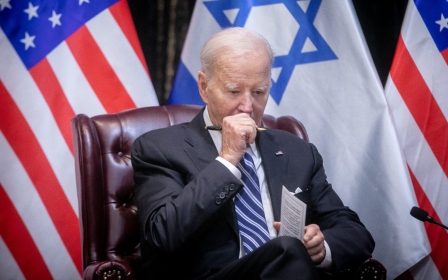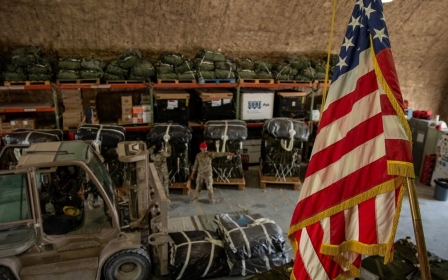War on Gaza: US to review Israeli assurances it is not violating international law

The State Department has received a letter from Israel saying it has provided assurances that its use of US-supplied weaponry does not violate international humanitarian law or American human rights law, several US news outlets have reported.
The letter was delivered on Friday with a signature from Israeli Defence Minister Yoav Gallant, The Washington Post reported, citing US and Israeli officials. Axios first reported on the letter.
The Biden administration now has until early May to formally assess whether those assurances are “credible and reliable” and report the findings to Congress.
US President Joe Biden issued a security memorandum in February outlining this process. If Israel's letter lacks the assurances the administration is seeking, it could lead to the suspension of arms transfers.
Middle East Eye reached out to the State Department for comment on the letter. MEE also asked whether the "assurances" provided referred to future actions taken by Israel in Gaza or all of the military actions it has taken since 7 October when the war broke out. The State Department did not respond by the time of publication.
New MEE newsletter: Jerusalem Dispatch
Sign up to get the latest insights and analysis on Israel-Palestine, alongside Turkey Unpacked and other MEE newsletters
Israel is one of the largest recipients of US military aid, getting nearly $4bn dollar each year from Washington. Since October, the US has fast-tracked shipments of arms to Israel, and on occasion has also bypassed congressional authority to do so.
Biden is also seeking an additional $14bn in military assistance to Israel after the war in Gaza.
Some of the armaments delivered to Israel include 2,000-pound bombs, despite rights groups expressing major concerns over the way Israel has been conducting its war.
Biden's security memorandum also requires Israel "facilitate and not arbitrarily deny, restrict or otherwise impede, directly or indirectly, the transport or delivery of United States humanitarian assistance”.
Still, any suspension of weapons transfers would not apply to "defensive" weapons, and the White House stated earlier this month that the administration had not set any "red lines" for Israel in its military campaign in Gaza.
US concerns of 'losing influence' with Netanyahu
The war in Gaza began on 7 October, when Hamas and other Palestinian armed groups launched an attack on southern Israel, killing 1,200 people including members of Israel's military and taking over 200 people as hostages back to Gaza.
Israel responded with full force, declaring war and launching an indiscriminate bombing campaign, followed by a ground invasion of the besieged enclave.
Its forces have targeted hospitals, schools and UN shelters, and so far have killed nearly 32,000 Palestinians, the majority of whom are women and children.
A growing number of US lawmakers have been calling on the US to stop arming Israel over its military operations in Gaza.
Senator Chris Van Hollen, a moderate Democrat, said that American weapons shipments to Israel should stop if Israel were to launch an invasion of Rafah, the southernmost city in Gaza.
On 11 March, Van Hollen and a group of senators also sent a letter to Biden calling on him to suspend weapons transfers to Israel if it continues to block US humanitarian aid from entering Gaza. Rights groups and aid agencies have accused Israel of blocking aid trying to enter Gaza. Israel denies this.
Human Rights Watch and Oxfam issued a joint report documenting what they said was Israel's clear “violations of international humanitarian law, deprivation of services critical to the survival of the civilian population and arbitrary denial and restrictions of humanitarian aid”.
The two groups further urged the Biden administration to determine that Israel's assurances are “not credible”, invoking a suspension of weapons transfers.
US officials told the Post that, in private, they have considered restricting arms shipments. However, those concerns are outweighed by concerns of "losing influence with the Netanyahu government".
Middle East Eye delivers independent and unrivalled coverage and analysis of the Middle East, North Africa and beyond. To learn more about republishing this content and the associated fees, please fill out this form. More about MEE can be found here.





